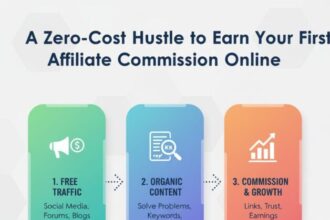I Was So Sick of Instagram I Could Scream. Then I Found These Places.
My thumb was dead.
I’m serious. I was on my couch, doing the thing. The endless, mindless scroll. Flick, flick, flick. And I suddenly realized the tip of my right thumb was completely numb. Just pins and needles. Like it had fallen asleep from boredom.
And what was I even looking at? The same five things I saw yesterday. A girl I went to high school with on a vacation I can’t afford. An influencer telling me to hustle harder while looking perfect in a perfect white kitchen. An argument about something stupid that was making my stomach feel like a clenched fist. An ad for pants. So many ads for pants.
It was just… noise. A loud, glittering, deeply unsatisfying noise.
And I was supposed to be using this noise to “build my brand.” I have this little blog, this thing I pour my heart into, and all the experts say you have to be on social media. So I was trying. I was posting my little pictures on Instagram. I was trying to figure out what a “Reel” was. I was throwing my thoughts onto Facebook, where they were promptly ignored by the algorithm in favor of my aunt sharing a questionable meme.
It felt like I was trying to whisper my deepest secrets in the middle of a rave. And I was getting tired. So, so tired of shouting.
That night, I opened my laptop and typed something different into Google. Not “how to get more followers.” Not “best time to post on Instagram.” I just typed, “quiet places on the internet.”
I wasn’t looking for a marketing strategy. I was just looking for a library. A quiet corner.
And that’s how I tumbled down a rabbit hole and discovered there are all these other social media platforms you’ve forgotten about, or maybe never even knew were there. This isn’t a guru’s guide. This is just the story of how I quit the rave and found a few quiet, cozy coffee shops where you can actually hear yourself think.
My First, Clumsy Attempts to Leave the Matrix
My initial escape attempts were, to put it mildly, a bit of a disaster.
I was full of hope at first. I found articles about “ethical alternatives” and “decentralized social networks.” The names themselves were exciting. They sounded like planets from a sci-fi novel. It felt like I was on the frontier of a new, better internet.
Then I actually tried to sign up for one. It was not a friendly process. There was no big, cheerful “Log in with Google” button. There were words like “server instance” and “federation.” I had to read a wiki page just to figure out how to create a password. It felt less like joining a social network and more like trying to get a security clearance.
I felt like a tourist who had taken a wrong turn down a dark alley in a city where I didn’t speak the language. This was my introduction to niche social media sites, and honestly, it was mostly just confusing.
The Sad, Echoing Halls of “Better” Social Media
My first real breakthrough—or so I thought—was when I managed to create a profile on a platform that promised to be the “mindful alternative to Facebook.” I loved the mission. I was so on board.
I filled out my profile, uploaded a nice picture, wrote a witty bio. And then… I waited. And waited.
The main feed was like a ghost town. The last post was from two weeks ago, and it was from the site’s founder. I searched for groups about my interests—baking, history, cats—and they were all empty. Just me and the digital tumbleweeds.
It was like showing up for a party, but the party had happened last month.
That’s the first hard lesson I learned. A social network can have the best intentions in the world, but if it doesn’t have people, it’s just a well-designed database. It’s just an empty room.
The Time I Accidentally Crashed a Ham Radio Convention
My most memorable failure, the one that still makes me cringe, was when I joined a forum based on “hobbies.” This sounded perfect! This was my people.
I was looking for a community of fellow sourdough bread nerds. I must have had a typo in my search query. Or maybe I just clicked on the wrong link in a moment of distraction. I honestly don’t know what happened.
But I found myself in a discussion group. And as I started reading the posts, a slow, dawning horror crept over me. This was not a group for bakers. This was a group for elderly gentlemen who were deeply, profoundly passionate about ham radio.
They were talking about antennas and transceivers and something called a “DXpedition.”
I had no earthly idea what was going on.
And they were so sweet! A man named Bob welcomed me to the group. “Glad to have you aboard, OM!” he wrote. I had to Google “OM.” It means “Old Man.” The irony was thick enough to slice.
I felt like I had just accidentally walked into the wrong hotel conference room and interrupted a keynote speech. I mumbled a digital “my bad” and quietly backed out of the room, my face hot with embarrassment.
It was a silly mistake, but it taught me something vital. You can’t just be a tourist in these small, passionate communities. You can’t just show up and start talking about yourself. You have to actually be one of them. You have to care about the antennas.
The Social Media “Rules” That Are Mostly Just Lies
After my brief and confusing career as a ham radio enthusiast, I started to get angry.
I was angry at all the advice I’d been following. All the “gurus” and “experts” with their checklists and their blueprints for success.
I realized that almost all of their advice is based on a world that only contains three places: Facebook, Instagram, and TikTok. It’s like a travel guide that only reviews TGI Fridays, Applebee’s, and Chili’s, and pretends that local restaurants don’t exist.
Their rules just don’t work when you leave the chain restaurants.
The “You Have to Be Everywhere” Myth That’s Giving Us All a Nervous Breakdown
This is the one that was destroying my mental health. This idea that you have to be on all the platforms, all the time. Posting a perfectly crafted photo to Instagram, a witty thought to Twitter, a professional update to LinkedIn, a funny video to TikTok.
It’s insane. It’s a full-time job. And it’s a job that makes you feel like you’re constantly failing.
You end up stretched so thin that you’re not really present anywhere. Your content starts to feel generic and soulless because you’re trying to make one thing that works everywhere, which is impossible.
The goal isn’t to be everywhere. The goal is to be somewhere. Somewhere real. Somewhere your people are. It’s about finding your target audience where they actually live, not trying to scream at them from a dozen different street corners.
The “Big Follower Count” Lie That Broke Our Brains
The big platforms are like a casino. They’re designed to keep you hooked on the thrill of the numbers. The likes. The shares. And the biggest, most addictive number of all: the follower count.
We see an account with a million followers and our lizard brain thinks, “Success!”
But what is that number, really? Often, it’s nothing. It’s a vanity metric.
What would you rather have? 200,000 followers who scrolled past your post without even registering it? Or 200 followers who read every word, who send you messages, who would actually notice if you disappeared tomorrow?
It’s not even a question.
These smaller platforms will never give you the ego rush of a massive follower count. But they can offer you something so much better. A community. A real one. I read this fascinating report from the Pew Research Center that showed how wildly different the demographics are on each platform. You can find it here. It was a lightbulb moment for me. The biggest crowd isn’t always the right crowd.
The “Copy and Paste” Myth for Lazy People
This was my sin. I admit it. I’d write a blog post, and then I’d just copy and paste the link to Facebook, Twitter, and everywhere else with the same generic caption.
It’s lazy. And it’s incredibly disrespectful to the people on those platforms.
It’s like showing up to a dinner party and instead of talking to people, you just stand on a chair and read your resume out loud.
People can tell you’re not really there. You’re just broadcasting.
Every platform has its own culture. Its own language. Its own etiquette. A joke that kills on Twitter will get you blank stares on LinkedIn. A heartfelt story that resonates on Facebook will get you downvoted into oblivion on Reddit.
You have to read the room. That’s the heart of a real content strategy for different platforms.
The Simple Idea That Cured My Instagram Sickness
I was so tired of the game. I was tired of chasing the algorithm. I was tired of feeling like I was performing all the time.
The moment it all changed for me was when I stopped thinking about “social media” as a marketing channel.
And I started thinking about it like a city.
The big “aha” moment, the idea that finally gave me permission to relax, was this: Facebook and Instagram are not the whole city. They’re just the loud, obnoxious, tourist-trap downtown.
The “Times Square” Mistake
For so long, I had been trying to build my thing in the middle of Times Square. I was trying to have a deep, meaningful conversation, but I was standing right next to a guy breakdancing and another guy dressed as a giant, terrifying Elmo.
I was shouting to be heard over a million other people who were also shouting. And I was wondering why I was so exhausted and why nobody was listening.
It’s a rigged game if you’re a small, quiet person. You can’t out-shout the billboards.
My New Goal: Just Find a Good Coffee Shop
A real city isn’t just Times Square. It’s a collection of neighborhoods.
There’s the artsy neighborhood with the cool little galleries. There’s the quiet, residential neighborhood with the great parks. There’s the old, historic neighborhood with the amazing bookstores.
The internet is the same. It’s not just the big, loud downtown. It’s full of these smaller, quieter neighborhoods where people with specific passions gather. These are the alternatives to Instagram. They offer the true benefits of smaller social networks.
My new mission was simple: Get out of Times Square. Go find a neighborhood where I actually want to hang out. Go find the coffee shop where people are sitting and reading and having quiet conversations. Go find my people. It’s a journey I wrote about in my post, “Why I Think ‘Finding Your Niche’ Is Both the Best and Worst Advice.”
The Quiet Corners of the Internet Where I Actually Enjoy Myself Now
So where did I end up? After all my weird adventures?
This isn’t a “Top 4” list. This is just my list. These are the four “neighborhoods” that felt like coming home.
1. The Internet’s Weird, Wonderful, Messy Town Square: Reddit
Okay, I know, Reddit isn’t exactly a secret. But most people who are trying to promote something are, rightly, terrified of it. Redditors have a built-in, highly sensitive BS detector. If you show up and try to sell them something, they will publicly humiliate you. And that’s why it’s great. It’s a place where you are forced to be a real human. It’s not one big site; it’s a million tiny little villages called subreddits. There’s a village for every hobby, every interest, every weird thought you’ve ever had. r/CozyPlaces. r/Breadit (for bread lovers!). r/AskHistorians. The only way to engage in marketing on Reddit is to not market at all. You just show up, be a cool, helpful member of the village, and after a long, long time, you might earn the right to mention that you also have a thing outside the village. The Reddit Ads Help Center (here) is actually a fascinating read just to understand the site’s unique culture.2. The World’s Biggest, Quietest Library: Goodreads
If your people are readers—of any kind—this is your place. It’s a social network where the only point is to talk about books. It is calm. It is thoughtful. It is nerdy in the best possible way. People have real, in-depth discussions about themes and characters. It’s the polar opposite of the frantic energy of TikTok. If you happen to be an author, their Author Program (here) is essential. But even if you’re not, you can just exist as a fellow reader, connecting with people over a shared love of stories.3. The Digital Dream Board: Pinterest
I got Pinterest wrong for so long. I thought it was just a place for planning weddings and finding recipes. It’s not. It’s a search engine for your eyes. People go there not to be social, but to find inspiration and to plan their future. “What should I wear?” “What should I build?” “Where should I go?” If your work is visual in any way, it can be a secret weapon. It’s not about conversation; it’s about providing a beautiful, useful answer to a visual question.4. The Hidden Treehouses: Niche Forums and Discords
This is the deep cut. This is the old internet that’s still kicking. For every passion, there is a dusty old forum powered by software from 1998, or a modern, lively Discord server. This is where the true believers live. The super-fans. The people who will talk about the minutiae of your shared interest for hours. Finding them takes some real detective work on Google. But when you find your treehouse, you’ve found your home. This is the heart of real community building online. It’s not scalable. Thank God. It’s just real. It’s a lesson I learned the hard way, which I wrote about in my post, “My Failed Attempt at Becoming a TikTok Star.”
So, Have I Given Up on Social Media? (Spoiler: It’s Complicated.)
The guy with the numb thumb? That was me. And some days, it still is.
I haven’t deleted all my accounts. I still peek at Instagram every now and then.
But it feels different. It feels like visiting a foreign country. It’s interesting to see the sights, but I don’t live there anymore. Its loud, chaotic energy doesn’t own me.
This whole journey wasn’t about finding a better way to market my blog. It was about finding a better way to be a person on the internet. It was about finding places where I could connect with other humans without feeling like I had to scream or perform.
It’s not about being everywhere. It’s about being somewhere you actually like, talking to people you actually like.
What a radical idea.
If you’re feeling that same burnout, that same soul-crushing exhaustion from the noise, maybe it’s time to find a new neighborhood.
So, here’s my question to you. What’s the one thing you love, the one nerdy, specific passion you have, that you wish you could talk to more people about? Where do you think your people are hiding?
































